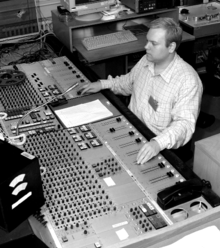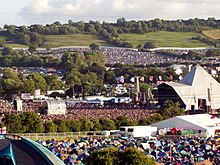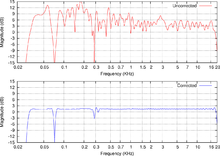Audio engineer: Difference between revisions
Removing duplicated content added in rev 574963740 |
No edit summary |
||
| Line 276: | Line 276: | ||
[[Category:Broadcasting occupations]] |
[[Category:Broadcasting occupations]] |
||
[[Category:Audio engineering| ]] |
[[Category:Audio engineering| ]] |
||
[[ar:هندسة صوت]] |
|||
[[es:Ingeniería de audio]] |
|||
[[fa:مهندسی صوت]] |
|||
[[he:טכנאי קול]] |
|||
[[ja:レコーディングエンジニア]] |
|||
[[no:Audioteknologi]] |
|||
[[nn:Audioteknologi]] |
|||
[[pt:Engenharia acústica]] |
|||
[[sr:Музичка продукција и снимање звука]] |
|||
[[sh:Muzička produkcija i snimanje zvuka]] |
|||
[[th:วิศวกรเสียง]] |
|||
[[uk:Звукорежисер]] |
|||
Revision as of 06:42, 6 October 2013

An audio engineer is concerned with the recording, manipulation, mixing and reproduction of sound. Many audio engineers creatively use technologies to produce sound for film, radio, television, music, electronic products and computer games. Alternatively, the term audio engineer can refer to a scientist or engineer who develops new audio technologies working within the field of acoustical engineering.[1]
Audio engineering concerns the creative and practical aspects of sounds including speech and music, as well as the development of new audio technologies and advancing scientific understanding of audible sound.[1]
Research and development
Audio Engineers who carry out research and development invent new technologies, equipment and techniques, to enhance the process and art.[2] They might design acoustical simulations of rooms, shaping algorithms for audio signal processing, specify public address systems, carry out research on audible sound for video game console manufacturers, and other advanced fields of audio engineering. They might also be referred to as acoustic engineers.[3][4]
Education
Audio engineers working in research and development may come from backgrounds such as acoustics, computer science, broadcast engineering, physics, acoustical engineering and electronics. Audio engineering courses at university or college fall into two rough categories: (i) training in the creative use of audio as a sound engineer, and (ii) training in science or engineering which then allows students to pursue a career developing audio technologies. The second type of courses necessarily have the significant scientific and mathematical content needed to carry out research and development in audio engineering.[5]
Audio engineers in research and development usually possess a bachelor's degree or higher qualification in acoustics, physics, computer science or another engineering discipline. They might work in acoustic consultancy, specializing in architectural acoustics.[6] Alternatively they might work in audio companies (e.g. headphone manufacturer), or other industries which need audio expertise (e.g. automobile manufacturer), or carry out research in a university. Some positions, such as faculty (academic staff) require a Doctor of Philosophy. In Germany a Toningenieur is an audio engineer who designs, builds and repairs audio systems.
Sub-disciplines
The listed subdisciplines are based on PACS (Physics and Astronomy Classification Scheme) coding used by the Acoustical Society of America with some revision.[7]
Audio signal processing
Audio engineers develop algorithms to allow the electronic manipulation of audio signals. These can be processes at the heart of much audio production such as reverberation, Auto-Tune or perceptual coding (e.g. mp3). Alternatively the algorithms might carry out echo cancellation on Skype, or allow audio tracks to be categorised or identified through Music information retrieval (e.g. Shazam (service)).[8]
Architectural acoustics

Architectural acoustics is the science and engineering of achieving a good sound within a room.[9] For audio engineers, architectural acoustics can be about achieving good speech intelligibility in a stadium or enhancing the quality of music in a theatre.[10] Architectural Acoustic design is usually done by acoustic consultants.[6]
Electroacoustics

Electroacoustics is concerned with the design of headphones, microphones, loudspeakers, sound reproduction systems and recording technologies.[4] Examples of electroacoustic design include portable electronic devices (e.g. mobile phones, portable media players, and tablet computers), sound systems in architectural acoustics, surround sound in movie theater and vehicle audio.
Musical acoustics
Musical acoustics is concerned with researching and describing the science of music. In audio engineering, this includes the design of electronic instruments such as synthesizers; the human voice (the physics and neurophysiology of singing); computer analysis of audio; music therapy, and the perception and cognition of music.[11]
Psychoacoustics
Psychoacoustics is the scientific study of how humans respond to what they hear. At the heart of audio engineering are listeners, who are the final arbitrator as to whether an audio design is successful, for instance whether a binaural recording sounds immersive.[8]
Speech
The production, computer processing and perception of speech is an important part of audio engineering. Ensuring speech is transmitted intelligibly, efficiently and with high quality; in rooms, through public address systems and through mobile telephone systems are important areas of study.[12]
Practitioner

Producer, engineer, mixer Phil Ek has described audio engineering as the "technical aspect of recording—the placing of microphones, the turning of pre-amp knobs, the setting of levels. The physical recording of any project is done by an engineer... the nuts and bolts."[13] A variety of terms are used to describe audio engineers who install or operate sound recording, sound reinforcement, or sound broadcasting equipment, including large and small format consoles. Terms such as "audio technician", "sound technician", "audio engineer", "audio technologist", "recording engineer", "sound mixer" and "sound engineer" can be ambiguous; depending on the context they may be synonymous, or they may refer to different roles in audio production. Such terms can refer to a person working in sound and music production, for instance a "sound engineer" or "recording engineer" is commonly listed in the credits of commercial music recordings (as well as in other productions that include sound, such as movies). They can also refer to technicians who maintain professional audio equipment. Certain jurisdictions specifically prohibit the use of the title engineer to any individual not a registered member of a professional engineering licensing body.
In German, the Tontechniker (audio technician) is the one who operates the audio equipment and the Tonmeister (sound master) is a person who creates recordings or broadcasts of music who is both deeply musically trained (in classical and non-classical genres) and who also has a detailed theoretical and practical knowledge of virtually all aspects of sound.[citation needed]
Education
Audio engineers come from backgrounds such as audio, fine arts, broadcasting or music. Some audio engineers working in production are autodidacts with no formal training.
Practitioners

In the recording studio environment, a sound engineer records, edits, manipulates, mixes, or masters sound by technical means in order to realize an artist's or record producer's creative vision. While usually associated with music production, an audio engineer deals with sound for a wide range of applications, including post-production for video and film, live sound reinforcement, advertising, multimedia, and broadcasting. In larger productions, an audio engineer is responsible for the technical aspects of a sound recording or other audio production, and works together with a record producer or director, although the engineer's role may also be integrated with that of the producer. In smaller productions and studios the sound engineer and producer is often one and the same person.
In typical sound reinforcement applications, audio engineers often assume the role of producer, making artistic and technical decisions, and sometimes even scheduling and budget decisions.[14]
Sub-disciplines
There are four distinct steps to commercial production of a recording: recording, editing, mixing, and mastering. Typically, each is performed by a sound engineer who specializes only in that part of production.
- Studio engineer – an engineer working within a studio facility, either with a producer or independently.
- Recording engineer – engineer who records sound.
- Assistant engineer – often employed in larger studios, allowing them to train to become full-time engineers. They often assist full-time engineers with microphone setups, session breakdowns and in some cases, rough mixes.[14]
- Mixing engineer – a person who creates mixes of multi-track recordings. It is common for a commercial record to be recorded at one studio and later mixed by different engineers in other studios.
- Mastering engineer – typically the person who mixes the final stereo tracks (or sometimes just a few tracks or stems) that the mix engineer produces. The mastering engineer makes any final adjustments to the overall sound of the record in the final step before commercial duplication. Mastering engineers use principles of equalization and compression to affect the coloration of the sound.
- Game audio designer engineer – deals with sound aspects of game development.
- Live sound engineer
- Front of House (FOH) engineer, or A1.[15] – a person dealing with live sound reinforcement. This usually includes planning and installation of loudspeakers, cabling and equipment and mixing sound during the show. This may or may not include running the foldback sound. A live/sound reinforcement engineer hears source material and tries to correlate that sonic experience with system performance.[16]
- Wireless microphone engineer, or A2. This position is responsible for wireless microphones during a theatre production, a sports event or a corporate event.
- Foldback or Monitor engineer – a person running foldback sound during a live event. The term "foldback" is outdated and refers to the practice of folding back audio signals from the FOH (Front of House) mixing console to the stage in order for musicians to hear themselves while performing. Monitor engineers usually have a separate audio system from the FOH engineer and manipulate audio signals independently from what the audience hears, in order to satisfy the requirements of each performer on stage. In-ear systems, digital and analog mixing consoles, and a variety of speaker enclosures are typically used by monitor engineers. In addition most monitor engineers must be familiar with wireless or RF (radio-frequency) equipment and must communicate personally with the artist(s) during each performance.
- Systems engineer – responsible for the design setup of modern PA systems which are often very complex. A systems engineer is usually also referred to as a "crew chief" on tour and is responsible for the performance and day-to-day job requirements of the audio crew as a whole along with the FOH audio system. This is a sound-only position concerned with implementation, not to be confused with the interdisciplinary field of system engineering which requires a college degree.
- Audio post engineer – a person who edits and mixes audio for film and/or television programs.
Equipment

An audio technician is proficient with different types of recording media, such as analog tape, digital multitrack recorders and workstations, and computer knowledge. With the advent of the digital age, it is becoming more and more important for the audio technician to be versed in the understanding of software and hardware integration from synchronization to analog to digital transfers. Audio engineers in their daily work operate and make use of:
- Amplifiers
- Analog-to-digital converters
- Digital audio workstations (DAW)
- Digital-to-analog converters
- Dynamic range compressions
- Loudspeakers
- Microphones
- Mixing consoles
- Music sequencers
- Preamplifiers
- Signal processors
- Tape machines
Recording engineers of note
Mastering engineers of note
Live sound engineers of note
See also
|
References
- ^ a b wiseGeek. "What Is Audio Engineering?". Retrieved 17 May 2013.
- ^ Daley, Dan, "The Engineers Who Changed Recording: Fathers Of Invention", Sound on Sound magazine, October 2004
- ^ University of Salford. "Graduate Jobs in Acoustics". Retrieved 13 May 2013.
- ^ a b Acoustical Society of America. "Acoustics and You". Retrieved 13 May 2013.
- ^ University of Salford, Acoustics. "Physics and music technology degrees". Retrieved 17 May 2013.
- ^ a b National Careers Service. "Job profiles: Acoustics consultant". Retrieved 13 May 2013.
- ^ Acoustical Society of America. "PACS 2010 Regular Edition—Acoustics Appendix". Retrieved 22 May 2013.
- ^ a b Pohlmann, Ken (2010). Principles of Digital Audio, Sixth Edition. McGraw Hill Professional. p. 336. ISBN 9780071663472.
- ^ Morfey, Christopher (2001). Dictionary of Acoustics. Academic Press. p. 32.
- ^ Templeton, Duncan (1993). Acoustics in the Built Environment: Advice for the Design Team. Architectural Press. ISBN 978-0750605380.
- ^ Technical Committee on Musical Acoustics (TCMU) of the Acoustical Society of America (ASA). "ASA TCMU Home Page". Retrieved 22 May 2013.
{{cite web}}: Unknown parameter|deadurl=ignored (|url-status=suggested) (help) - ^ Speech Communication Technical Committee. "Speech Communication". Acoustical Society of America. Retrieved 22 May 2013.
- ^ "Interview with Phil Ek". HitQuarters. 25 May 2009. Retrieved Sep 3, 2010.
- ^ a b Huber, D.M. (1995). Modern Recording Techniques. (5th ed.). Burlington, MA: Focal Press
- ^ "Front of House (FOH) Engineer", Get in Media Entertainment Careers
- ^ Davis, G., Jones R. (1990). Yamaha Sound Reinforcement Handbook. (2nd ed.) Milwaukee, WI: Hal Leonard Corp.
External links
- Audio Engineering Society
- Audio engineering formulas and calculators
- Recording engineer video interviews
- A free collection of online audio tools for audio engineers
- WikiRecording's Audio Engineer Directory
- Audio Engineering online course under Creative Commons Licence
- Audio White Papers, Articles and Books
- Rane Pro Audio Reference
- Audio Engineers Freelancer Marketplace
